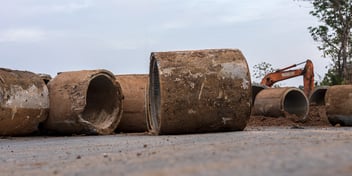Take, make, waste: Why we need to change the global economy
After working in Indonesia and seeing the amount of waste sent to landfill, Ashleigh Morris returned home to Australia determined to make a change – not just in her life, or even in her community, but to the entire economic system.
“Our economy is structured around take, make, waste: we take resources to make products, which we use, and when we no longer want them we throw them away,” Morris said ahead of her talk at the Australian Water Association’s Young Water Professionals Conference this week.
“It’s built on consumption; if we’re not buying and consuming the whole thing collapses.”
Her desire to find a solution to the great waste problem led to the creation of Coreo, or what Morris describes as her “accidental business”. She founded the company alongside her sister, Jaine, last year with the aim of helping companies transition their business models to a circular economy.
It followed The Circular Experiment, a six-month pilot project that saw the sisters working with 45 businesses on Ocean Street in Maroochydore, Queensland, to implement six circular economy concepts.
In a circular economy, waste and pollution are designed out of business models, and products and materials are used at their highest value for as long as possible.
“Most people think it’s just about recycling, but this is the lowest common denominator or the option of last resort,” Morris said.
“It’s not that simple – it’s a really complex model, because our economy is complex, and it’s about looking at the entire system and economic structure.”
The Circular Experiment was a resounding success and proved the sisters were on the right track.
“By working with small businesses we were able to test the merit of a circular economy,” Morris said.
“We learnt from our experiment what it could mean if we applied it at a much more systemic level, at a country level.”
Going circular
Today, Coreo operates in Australia, New Zealand and the United States and has been involved in more than 25 projects, working with big names including property developer Lendlease and mining giant Rio Tinto.
“We went from working for free on The Circular Experiment as a family partnership to having one of Australia's largest multinationals as our first client,” Morris said.
 Ashleigh and Jaine Morris started Coreo after a six-month pilot project
Ashleigh and Jaine Morris started Coreo after a six-month pilot project
“[But] we’re an accidental business; we’ve never done any marketing in our lives … What we offer is very different as it’s impact driven rather than financially driven – it’s about making positive change and creating positive impacts.”
Morris said one of Coreo’s most memorable projects to-date was working with Lendlease to create a circular economy strategy for a master-planned community in Logan, 40 km from Brisbane.
“We looked at the circular economy and all it offers,” she said.
“Not just in terms of waste but also energy, agriculture, technological solutions and community needs, and how we could integrate it all to get the maximum benefit for all stakeholders, including the developer, the local community and the state government.”
She also hinted at an exciting soon-to-be-revealed project with Rio Tinto, which is focused on copper.
“When that’s announced it’s going to be a game-changer for how metals are mined,” Morris said.
Embracing opportunities
According to the Coreo approach, there are five business models that arise from the circular economy:
-
- circular supplies, where traditional materials are replaced with renewable or recovered materials, which will reduce the need to extract virgin resources in the long term;
- resource recovery, which leverages technology to recover and re-use resources;
- product life extension, where the lifecycle of products and assets are extended to ensure they remain economically useful;
- sharing platforms, with under-utilised products shared to reduce demand for new products; and
- product as a service, with consumers using products through a lease or pay-for-use arrangement as opposed to the conventional approach to ownership.
While companies might be sceptical or scared about transitioning away from business as usual, Morris said people should look at the opportunities the circular economy presents and manage the risks, rather than the other way around.
“We have the intelligence and advances in technology to define a new economy that is fit for the 21st century, and we should embrace that,” she said.
“Nothing is all good, and there will be winners and losers, but going forward, your business isn’t going to be the same as it is today. Why not embrace the opportunity to change?”


